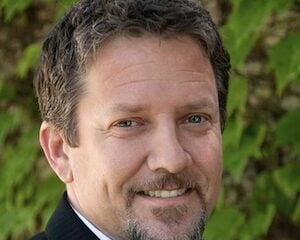PBS entrusts key funding job to good friend of its president
With PBS under increasing budgetary pressure, President Paula Kerger recently turned to Smithsonian Institution fundraiser Brian Reddington for the important new post of senior v.p. of development and executive director of the PBS Foundation. In January, when she told the PBS Board of Reddington’s selection, she said he was a friend of hers.
Kerger did not mention that she, her husband and Reddington owned a condominium together in New York City from September 2003 to September 2006.
PBS hired Reddington without engaging a search firm or advertising the opening, the network said last week in a statement responding to many but not all of Current’s questions.
Top PBS Board leaders back the hiring. Geoffrey Sands, who was elected Board chair in January, said he was not aware of the joint mortgage until Kerger told him in February. “I was really not bothered by it in the least,” said Sands, a director at McKinsey & Co., a management consulting firm in New York City.
Kerger also disclosed the mortgage relationship to PBS Board Vice Chair John S. Domaschko, a Kentucky accounting executive. “That didn’t set off any alarms for me,” he said. “It’s not unusual for people to hire people they know and have some background with.”
But such hires push a hot-button issue: Public broadcasting’s commitment to diversify its largely white male corps of decision-makers. Since Kerger arrived in March 2006, PBS has appointed eight execs at the senior v.p. level or above. One is African American — Michael Jones, chief operating officer. Another is a woman — Joyce Herring, senior v.p. of station services. The remaining six, including Reddington, are white men.
If PBS wants a more multicultural executive staff, “hiring people you know who don’t match that objective is not helpful,” said Lisa Whitmore, a workplace diversity specialist for the Society of Human Resources Management (SHRM), an international industry membership group of 250,000 HR professionals.
Comfort zone for hiring
PBS did not answer a request to explain how Reddington came to the hiring process, whether any other candidates were considered, or whether any of those were culturally or gender diverse. PBS spokesperson Jan McNamara said in an e-mail, “We will not disclose information regarding candidates considered for any position who did not receive a final appointment, or those who may have declined an employment offer.”
From January 2007 to January 2008, the number of minority officials and managers in national pubcasting organizations CPB, PBS and NPR decreased from 31.9 percent to 25.8 percent, according to CPB’s latest annual diversity report to Congress in June 2009. Jones, PBS’s chief operating officer, told Current in a statement last week that minorities comprise some 30 percent of total PBS employees.
The disproportionately low participation of minorities in public TV decision-making was thrust into the news in 2007 during the rancor over the absence of Hispanic soldiers interviewed in Ken Burns’ 14-hour World War II documentary, The War.
After that conflict, PBS launched a yearlong Diversity Initiative, headed by Haydee Rodriguez, a past executive director of the Maryland Governor’s Commission on Hispanic Affairs. She surveyed decision-makers inside and outside of the system, minority and white, for their input on a plan to bring to pubTV new and different voices, particularly in content. PBS submitted her final report in November 2008 to the study’s funder, the Ford Foundation, but did not release it publicly.
PBS also did not provide data on the diversity of public TV decisionmakers requested by the CPB-funded National Minority Consortia, according to a consortia official. The groups had requested the data in 2005 and asked again in 2009.
Sands, the new PBS Board chair, said Kerger is a consistent advocate for diversity in hiring. “Having known Paula a long time, and having sat through a lot of long board meetings with her, whenever the topic of diversity comes up, whether in staff or board composition, Paula is always the most conscious of diversity.”
But an exec’s work to culturally balance a firm’s employees “means reaching out beyond their comfort zone to hire, and oftentimes companies don’t do that,” Whitmore said. “If there’s a real commitment to increasing diversity, then there’s going to need to be that effort. It would take a very, very long time to happen naturally.”
“Diversity is a tough, complicated issue,” Rodriguez said. “Everybody wants it, but it’s hard to bring about.”
Stephen Gong, executive director of the Center for Asian American Media, part of the minority consortia, sees the continuing predominance of white men in pubTV as an example of the ongoing challenges in both personnel and programming. “I would have hoped PBS could have shown more leadership in hires,” Gong said. “The Obama administration has shown that you don’t have to sacrifice quality and experience of people to reflect the diversity of the country.”
“Case-by-case decisions”
“Brian Reddington was hired because he is an accomplished fundraising professional,” Jones said in a response to Current. Sands said that he was “actually very comforted” by Reddington’s appointment. “Fundraising is such a huge issue for all nonprofits.” If a hire is a poor fit for the organization, “that sets you back six months of fundraising, more like a year, to figure that out and find a replacement. I was heartened that Paula could vouch for Brian.”
Reddington, 49, was previously director of institutional advancement in the Central Office of Development at the Smithsonian, reporting to the director of external affairs, from September 2006 until February 2010. From 2001 to 2006 he was development director for Mount Sinai Medical Center in New York City. PBS said he also held “senior-level development positions” at Lenox Hill Hospital, Carnegie Hall and Pace University, all in New York City.
Kerger is also a fundraiser, with experience at the Metropolitan Opera and New York’s WNET. By 2003 she had risen to v.p. and station manager of WNET. On Sept. 15 of that year, she jointly purchased a condo in the Chelsea neighborhood with her husband Joe, and Reddington, according to documents filed with the Office of the City Register in New York. The three took out a mortgage of $918,750, and sold the property Sept. 13, 2006, for $1.9 million. After accepting the PBS presidency, Kerger and her husband moved to the Logan Circle neighborhood of Washington, D.C. In August 2007, Reddington purchased a property about three blocks away.
“The Chairs of both the PBS Board of Directors and the PBS Foundation Board were aware that Paula and Brian were friends,” Jones said in a statement. Asked whether Kerger disclosed the mortgage to the board leadership, Jones said only, “the fact that Paula and Brian once owned property together in New York City is public record.”
Although PBS hiring rules say its Human Resources department will post vacancies, the guidelines also reserve the right for the network to waive the postings. According to Jones, this allows management “to make case-by-case decisions regarding the use of professional search firms and the posting of job announcements based on the specific circumstances, such as the need and the available candidate pool.” He added that PBS “does not use search firms routinely, given the costs involved.” PBS did not say why Reddington’s job was not advertised. Jones made the decision to offer Reddington the job, PBS said.
PBS employment guidelines say relatives or spouses cannot work together “in the same corporate area,” and an employee may not supervise someone with whom they have a personal relationship. Reddington and the other senior v.p.’s report to Jones (program chief John Wilson will report to the chief content officer when that position is filled — see separate story).
The reporting relationship between Kerger and Reddington at the PBS Foundation is less clear. The semi-autonomous Foundation is both a separate 501(c)(3) nonprofit corporation and a 509(a)(3), which means it is a supporting organization operating solely for the benefit of PBS. Kerger is its president, Reddington is its executive director. Jones said Reddington “will act as the PBS liaison” to the Foundation, but didn’t answer whether Reddington will report to Kerger.
Mary Bitterman, chair of the PBS Foundation Board, doesn’t see Kerger’s friendship and past mortgage with Reddington as problematic in their roles there. “I remember when we were dealing with him on a Smithsonian matter, [Kerger] indicated to me that he was one of her very, very good friends over many years,” she said. “And their ownership of real estate concluded several years ago.” She said she feels that Reddington is the right “seasoned development pro” to guide the Foundation.






